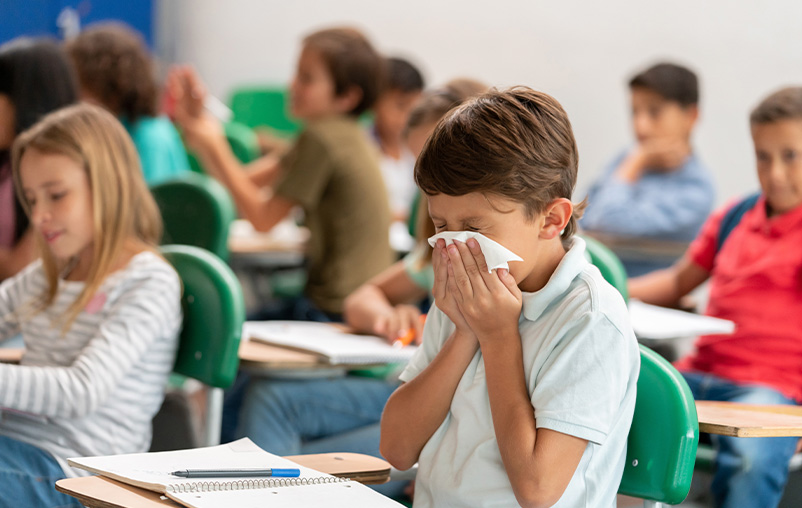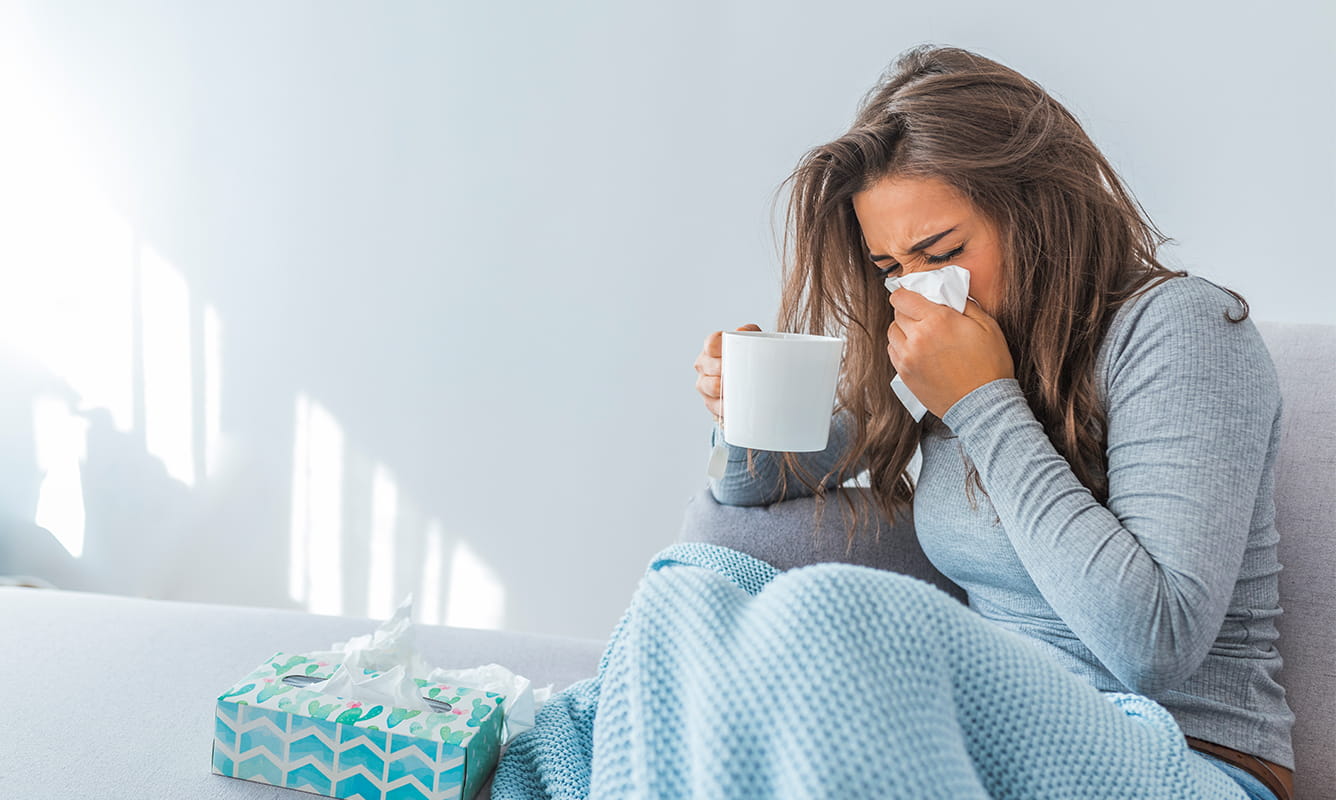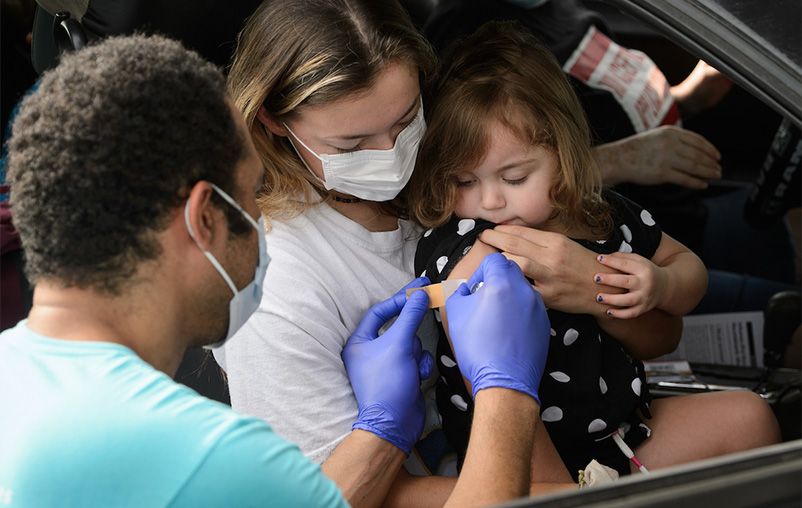Dr. Bryan Alsip addresses many common questions such as cloth masks, booster shots, COVID-19 tests and what to do if you can’t find one.
Why did the CDC shorten the time to 5 months between the Pfizer COVID-19 vaccine and boosters?
The FDA recently authorized and the CDC recently recommended a shortened duration at which someone can receive a booster dose for their Pfizer vaccine. So if you’ve had your first two doses of Pfizer COVID vaccine as a primary series, you can now get your booster dose as early as five months after your second dose. Doesn’t mean you have to get it five months after. You can get it after that period of time.
I think some of the data indicate that it would be better to get it closer to five months than six months because we’ve seen over time there’s been some waning of the immunity for all of the COVID vaccines. Therefore, their recommendation was that individuals, if they wanted a booster, could get it earlier rather than at six months.
Is it true that cloth masks don’t protect you from the Omicron variant, only N95s do?
It’s important to understand there’s not a single standard for cloth masks. There are some cloth masks that are very thin and porous, and some that are two or three layers, and some that incorporate high-grade filters, so collectively referring to all cloth masks as a single standard is inaccurate. It can be misleading.
Similarly so, when you talk about KN95 masks, unfortunately we know there are a lot of counterfeit KN95 masks in the market. The CDC estimates 60% or more that are on sale are actually counterfeit or false. So what you think you’re purchasing a higher grade, quality mask, it may actually not be.
All of that said, we’ve known since the beginning that there’s a spectrum of protection as it relates to masks. There were some early studies that looked at coronavirus and comparing masks, whether they were fabric or cloth masks to surgical or medical-grade masks, to KN95 masks to N95 masks. Not surprisingly, those that have a higher level of filtration or higher level of certification seem to offer more protection. But I don’t think that’s any different for omicron than it is for previous variants.
It’s important to understand that masks are just one part of our protection. Masks in and of themselves need to be properly worn no matter which one you’re using.
Masking in combination with vaccines and boosters, appropriate distancing and hand hygiene are all those things that help reduce your risk of exposure as well as infection.
With more breakthrough infections, do the COVID-19 vaccines protect us from Omicron at all?
The data still show that the current vaccines are protective against serious illness and hospitalization, which is probably the most important function of a vaccine. We certainly have seen breakthrough infections with omicron, just like we’ve seen breakthrough infections with delta and some of the earlier variants.
We know that none of the vaccines are 100% effective. That said, they still seem to be, for the most part, protecting those who are vaccinated at a higher percentage as compared to those who are unvaccinated, particularly if you have a booster. They also still seem to protect against serious illness and hospitalization.
Some people are getting a second or even third booster shot. Is this a good idea?
It’s generally not advisable to get more vaccination doses than are recommended simply because the data for safety and efficacy aren’t there yet. We’re still waiting to see over time how much longer our immunity lasts with a booster dose. We’ve seen with a primary series, say a two-dose series of an mRNA vaccine, immunity does tend to fall over time and that’s why the recommendation came out for a booster dose, which enhances that immunity.
But that could last several months or longer, so it’s important to follow those data to understand what would be the appropriate time to consider another dose. We also have to make sure it’s safe because with most vaccines, you can usually get a dose after the recommended interval. But you never really want to get a dose before the recommended interval for safety reasons.
Is it possible we will need another COVID-19 booster soon?
It’s certainly possible we could need another booster. How soon depends on the progression of the pandemic and the longevity of the immunity that is conferred from the vaccines.
Some countries like Israel have already recommended a fourth dose or a second booster for certain high-risk individuals. We have elderly individuals living in nursing homes and perhaps those who are severely immunocompromised. So maybe it’s a phased approach similar to that. For higher risk groups you consider yet another booster.
I think it’s also important to see over time how long the immunity lasts with the current booster dose recommendation. We still have a lot of people who haven’t received those, so I think that’s another important part.
Some parents still have concerns about vaccinating their children against COVID-19. What do we know about safety?
The more data we get, the more reassuring that the safety profile grows for offering these COVID vaccines to younger children. Generally speaking, I think the safety data that we have been getting in has helped assure both the FDA that they could authorize doses for even younger children, which they’ve done recently.
So inflammation of the heart and heart lining that they’ve seen in cases of individuals who have been vaccinated, those data have been fairly consistent over time that the rate of those occurrences don’t outweigh the benefits that one gets from the vaccine itself. And most of those cases are self-resolving, so they do go away. I think that’s one of the concerns that parents normally have and I think it’s important they discuss that with their pediatrician or primary care physician for their children.
There may be some unique medical needs they’re concerned about that they need to have conversations about. Each of those situations may be different.
Overall, the safety profile is actually getting better because we have more data, and those data actually indicate the frequency of those side effects are less over time as we get more patients vaccinated.
Is it true that COVID-19 home tests are more accurate when you swab your throat instead of your nose?
The first thing you have to keep in mind is that there isn’t a single type of home test kit. The important thing is no matter which one you use, to follow the manufacturer’s instructions. That’s essentially how the test kit was designed, that’s how it was tested, so it was authorized before it was released to the public.
That’s something people need to keep in mind: The most effective way to use a test is to follow the manufacturer’s instructions. Deviating from that may potentially lead to false results, whether they’re false positives or false negatives.
I think the testing companies need to continue to reevaluate their testing methodologies to make sure they’re current, and we want to make sure that, just like the vaccines are responding appropriately to the virus as it changes over time, we want to make sure that the tests we’re using also continue to be accurate, valid and reliable in terms of identifying COVID-19.
Can you test positive for COVID-19 on a PCR test if it’s really the flu?
No, if it’s a PCR test you can feel very comfortable that if it’s a positive PCR for COVID-19, it’s identifying specifically the SARS-CoV-2 virus. We also have PCR tests for influenza. We have tests that can evaluate whether you have COVID, COVID and flu, COVID, flu and respiratory syncytial virus, and even a full panel of other respiratory viruses.
There are very specific targets that those tests look for that allow clinicians to determine which virus you’re actually infected with.





